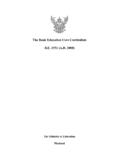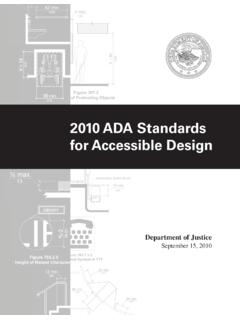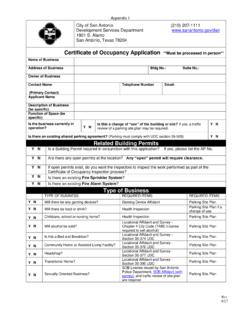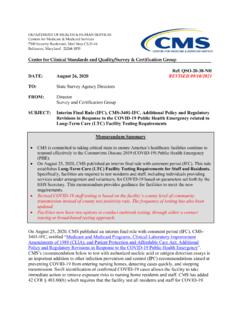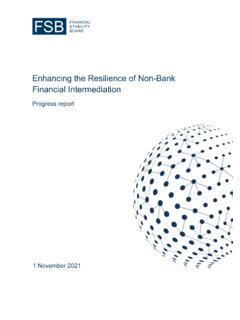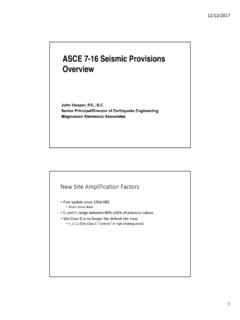Transcription of VA Policy Issuing Hearing Aids and Eyeglasses
1 Department of Veterans Affairs Network Policy V23-CM0-021 Veterans Health Administration May 26, 2009 VA Midwest Health Care Network (VISN 23) Policy for Issuing Hearing Aids and Eyeglasses 1. Purpose: To develop uniform criteria necessary for the issuance of Hearing aids and Eyeglasses to eligible veterans in Network 23. 2. Policy : a. Eligibility; Public Law 104-262 with specific reference 38 CFR Section states that notwithstanding any other provision of this part, Veterans Health Administration (VHA) will furnish neuro-sensory aids ( , Eyeglasses , Hearing aids) to veterans with continuing eligibility or otherwise enrolled and receiving VA care.
2 It i s VHA Policy that all enrolled and those ve terans exempt from enrollment are eligible for medical services that include diagnostic audiology and diagnostic and preventative eye care services. In accordance with this law, the following veterans are eligible for Hearing aids and Eyeglasses : 1) Those with any compensable service-connected disability 2) Those who are former Prisoners of War (POWs) 3) Those who were awarded a Purple Heart 4) Those in receipt of benefits under Title 38 United States Code ( ) 1151 5) Those in receipt of an increased pension based on being permanently housebound and in need of regular aid and attendance 6)
3 Those with vision or Hearing impairment resulting from diseases or the existence of another medical condition for which the veteran is receiving care or services from VHA, or which resulted from treatment of that medical condition, , stroke, Polytrauma, traumatic brain injury, diabetes, multiple sclerosis, vascular disease, geriatric chronic illnesses. toxicity from drugs, ocular photosensitivity from drugs, cataract surgery, and/or other surgeries performed on the eye, ear. or brain resulting in vision or Hearing impairment.
4 7) Those with significant functional or cognitive impairment evidenced by deficiencies in the ability to perform activities of daily living. 8) Those who have vision and/or Hearing impairment severe enough that it interferes with their ability to participate actively in their own medical treatment and to reduce the impact of dual sensory impairment (combined Hearing and vision loss). NOTE: Per VHA Directive 2008-070 the term "severe" is to be interpreted as a vision and/or Hearing loss that interferes with or restricts access to, involvement in, or active participation in health care services ( , communication or reading medication labels).
5 The term is not to be interpreted to mean that a severe Hearing or vision loss must exist to be eligible for Hearing aids or Eyeglasses . 9) Those veterans who have service-connected vision disabilities rated zero percent or service-connected Hearing disabilities rated zero percent if there is organic conductive, mixed, or sensory Hearing impairment, and loss of pure tone Hearing sensitivity in the low, mid, or high-frequency range or a combination of frequency ranges which contribute to a loss of communication ability; however, Hearing aids are to be provided only as needed for the service-connected Hearing disability.
6 B. Medical Necessity: Established after the veteran is determined to be eligible. A veteran must be both eligible and have a medical need to receive Hearing aids or Eyeglasses from prosthetics. Eligibility rules are the same tor both inpatients and outpatient medical services. 1) The veteran's VA primary care provider will initiate the referral to Audiology and Speech Pathology Service for a diagnostic Hearing evaluation. The Audiology and Speech Pathology Service is responsible for determining medical necessity (see attachment A.
7 } and prescribing the appropriate medical Hearing device. 2) The veteran's VA primary care provider will initiate the referral to Ophthalmology and Optometry Service for a diagnostic eye evaluation. The Ophthalmology and Optometry Service is responsible for determining medical necessity {see attachment B.) and prescribing the appropriate medical low vision aid, Eyeglasses and or blind aid. 3. Definitions and Comm unicative Criteria: a. Hearing Aid Candidate: 1) Audiologists must utilize the Remote Order Entry System (ROES} to review and request eligibility for Hearing aids; by requesting the Hearing aid in ROES, the audiologist stipulates that medical need exists based on the evaluation.
8 The audiologist is responsible for applying all the criteria in prescribing Hearing aids listed on attachment A and the following: a. The Veterans in Priority Groups 1-5 are eligible for Hearing aids. b. Non-service connected (NSC) ve terans (Priority Groups 6, 7, and 8) must receive a Hearing aid evaluation {HAE) prior t o determining eligibility for Hearing aids to establish medical justification for provision of these devices. These veterans must meet the following criteria for eligibility based on medical need: enrolled or exempt from enrollment and receiving a vested level of care from a VA medical facility; and Hearing loss that interferes with or restricts communication to the extent that it affects their active participation in the provision of health care services as determined by the audiologist.}
9 C. In those instances where the ve teran presents to the audiology clinic with a Hearing aid provided from a non-VA source, the audiologist determines the effectiveness of the device in meeting the veteran's rehabilitative needs. If the device is sufficient for the veteran's needs, no device will be prescribed, but the audiologist may register the Hearing aids through ROES for battery and repair services. If the device is not sufficient for the veteran's needs, the audiologist must apply the replacement provisions detailed in this Policy (See ).
10 B. Eyeglasses Candidate: 1) The eye care specialist is responsible for applying all the criteria in prescribing Eyeglasses listed on attachment B and the following: a. Veterans in Priority Groups 1-5 are eligible for Eyeglasses b. NSC veterans (Priority Groups 6, 7, and 8) must receive an appropriate evaluation by an optometrist or ophthalmologist, prior to determining eligibility for Eyeglasses , to establish medical justification for provision of these devices. In those instances where the veteran presents to the eye clinic with Eyeglasses provided from a VA or non-VA source, the eye care practitioner or provider determines the effectiveness of the device in meeting the veteran's rehabilitative needs.
